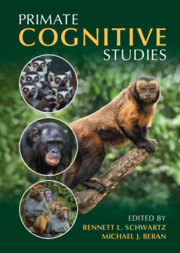Book contents
- Primate Cognitive Studies
- Primate Cognitive Studies
- Copyright page
- Contents
- Figures
- Tables
- Contributors
- Acknowledgments
- 1 The Purpose of Primate Cognitive Studies
- 2 A History of Primates Studying Primates
- 3 Genetic and Environmental Influences on Chimpanzee Brain and Cognition
- 4 The Evolution of Cognition in Primates, Including Humans
- 5 State of the Field
- 6 Current Perspectives on Primate Perception
- 7 The Comparative Study of Categorization
- 8 Numerical Cognition in Nonhuman Primates
- 9 The Natural History of Primate Spatial Cognition
- 10 Progress and Prospects in Primate Tool Use and Cognition
- 11 Sequencing, Artificial Grammar, and Recursion in Primates
- 12 The Evolution of Episodic Cognition
- 13 Metacognition
- 14 Bridging the Conceptual Gap between Inferential Reasoning and Problem Solving in Primates
- 15 The Eyes Have It
- 16 Social Cooperation in Primates
- 17 Primate Communication
- 18 Theory of Mind in Nonhuman Primates
- 19 A Requiem for Ape Language Research
- 20 Primate Empathy
- 21 Replication and Reproducibility in Primate Cognition Research
- 22 Ethical Considerations in Conducting Primate Cognition Research
- 23 Collaboration and Open Science Initiatives in Primate Research
- 24 Studying Primate Cognition
- 25 Do Monkeys Belong in the Ape House?
- Index
- References
21 - Replication and Reproducibility in Primate Cognition Research
Published online by Cambridge University Press: 28 July 2022
- Primate Cognitive Studies
- Primate Cognitive Studies
- Copyright page
- Contents
- Figures
- Tables
- Contributors
- Acknowledgments
- 1 The Purpose of Primate Cognitive Studies
- 2 A History of Primates Studying Primates
- 3 Genetic and Environmental Influences on Chimpanzee Brain and Cognition
- 4 The Evolution of Cognition in Primates, Including Humans
- 5 State of the Field
- 6 Current Perspectives on Primate Perception
- 7 The Comparative Study of Categorization
- 8 Numerical Cognition in Nonhuman Primates
- 9 The Natural History of Primate Spatial Cognition
- 10 Progress and Prospects in Primate Tool Use and Cognition
- 11 Sequencing, Artificial Grammar, and Recursion in Primates
- 12 The Evolution of Episodic Cognition
- 13 Metacognition
- 14 Bridging the Conceptual Gap between Inferential Reasoning and Problem Solving in Primates
- 15 The Eyes Have It
- 16 Social Cooperation in Primates
- 17 Primate Communication
- 18 Theory of Mind in Nonhuman Primates
- 19 A Requiem for Ape Language Research
- 20 Primate Empathy
- 21 Replication and Reproducibility in Primate Cognition Research
- 22 Ethical Considerations in Conducting Primate Cognition Research
- 23 Collaboration and Open Science Initiatives in Primate Research
- 24 Studying Primate Cognition
- 25 Do Monkeys Belong in the Ape House?
- Index
- References
Summary
Replication is an important tool used to test and develop scientific theories. Areas of biomedical and psychological research have experienced a replication crisis, in which many published findings failed to replicate. Following this, many other scientific disciplines have been interested in the robustness of their own findings. This chapter examines replication in primate cognitive studies. First, it discusses the frequency and success of replication studies in primate cognition and explores the challenges researchers face when designing and interpreting replication studies across the wide range of research designs used across the field. Next, it discusses the type of research that can probe the robustness of published findings, especially when replication studies are difficult to perform. The chapter concludes with a discussion of different roles that replication can have in primate cognition research.
Information
- Type
- Chapter
- Information
- Primate Cognitive Studies , pp. 532 - 550Publisher: Cambridge University PressPrint publication year: 2022
